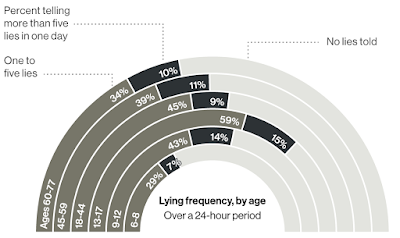 It turns out that everyone lies and most of us tell some kind of lie on a daily basis. Most lies are harmless. We lie to gain an advantage or make ourselves seem better than we are. Sometimes we even lie to protect someone's feelings. On the other hand, social scientists believe that most people tell at least one major lie in their lifetime. They use falsifying a college application or an affair as examples. As it turns out, humans learned to lie about as soon as we learned to talk. Telling a lie to gain food or a mate was just easier than hitting a competitor over the head with a rock.
It turns out that everyone lies and most of us tell some kind of lie on a daily basis. Most lies are harmless. We lie to gain an advantage or make ourselves seem better than we are. Sometimes we even lie to protect someone's feelings. On the other hand, social scientists believe that most people tell at least one major lie in their lifetime. They use falsifying a college application or an affair as examples. As it turns out, humans learned to lie about as soon as we learned to talk. Telling a lie to gain food or a mate was just easier than hitting a competitor over the head with a rock.How, when and why most of us lie depends on our age and our intelligence. Adolescents tend to lie much more than younger or older adults. As we get older, our ability to lie evolves and we get much better at it. There are even studies that show dramatic increases in neural fibers in the brain among good liars as compared to those that do not lie as much. Other studies strongly tie advanced abilities to lie to advanced cognitive function and intelligence. On the other hand, tests on children with autism show a very low ability to lie.
So if we know that everyone lies to us and that they do it to deceive us to gain an advantage, why do we believe it? You would think that as humans we would have evolved to detect a lie. Instead, we have done the exact opposite. Because we are creatures that greatly depend on a social group, our need to believe and trust those in our group outweighs the harm done by most lies. Therefore, humans have continued to be gullible. The onset of social media has only multiplied our lies and our acceptance of them. As we use social media to spread lies about ourselves we have also begun to intentionally believe lies that confirm our opinions of the world around us.
So what does all of this mean for us as educators? As we spend our days with the "Keep It 100%" generation, we probably need to keep in mind that they are doing everything but that. We need to know that even when we present them with evidence against a lie, they will likely dismiss that evidence. Teenagers lie to us and each other daily to improve their self-image, make excuses for their shortcomings or just to get what they want. If they are successful in fooling us, it's not our fault and may even show signs of intelligence. But also remember that all of us believe that we are good at lying and that when we do perceive that someone is not being truthful, we should trust that instinct because it is strong enough to defy our genetics.
So as the guy that is lied to more than anyone in the world, I say "Lie to me!" I may or may not believe you, but I do have a pretty good formative assessment on how smart you are.
No comments:
Post a Comment